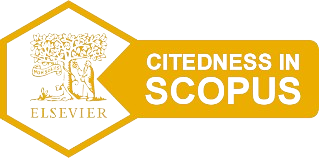SWOT Analysis of Development Strategy Entering the Disruption Era
DOI:
https://doi.org/10.15408/tjems.v10i1.33399Keywords:
strategy, SWOT, disruption, pesantren, strategi, disrupsiAbstract
Abstract
This study aims to find the right strategy for Darus Sunnah Pesantren to face in the disruption era. The disruption era is an era where digitalization is the motor of change that occurs in the social, economic, and cultural sectors. The strategy generated the strengths and weaknesses of Darus Sunnah Pesantren, as well as looking at opportunities and challenges outside Pesantren. This research is a qualitative type of case study model where interviews, observations, and document review as data collection techniques. The results showed that Pesantren Darus Sunnah could utilize its human resources, the majority of whom were millennials and had a good education, to take advantage of digital media, both to raise donations and market their books and promote the institution. Furthermore, based on existing strengths and threats, pesantren can empower their human resources by utilizing their alumni who are many in the digital world. Meanwhile, based on the weaknesses and opportunities, Darus Sunnah can take advantage of online donations and outside assistance to develop digital facilities and infrastructure within the Institution. Meanwhile, based on existing weaknesses and threats, Darus Sunnah can hold digital literacy programs and other programs that counteract the disruption era's negative impacts on stakeholders of Darus Sunnah Pesantren. This competency is also an additional competency for students in the era of disruption.
Abstrak
Penelitian ini bertujuan menemukan strategi yang tepat bagi Pesantren Darus Sunnah menghadapi era disrupsi. Era disrupsi merupakan era dimana digitalisasi menjadi motor perubahan yang terjadi dalam sektor sosial, ekonomi dan budaya. Strategi dihasilkan melalui analisis SWOT dengan menilai kekuatan dan kelemahan Pesantren Darus Sunnah, serta mencermati peluang dan tantangan di luar Pesantren. Penelitian ini berjenis kualitatif model studi kasus dimana wawancara, observasi dan telaah dokumen sebagai teknik pengumpulan data. Hasil penelitian menunjukan bahwa Pesantren Darus Sunnah dapat memanfaatkan sumber daya manusianya yang mayoritas dari kalangan milenial dan memiliki pendidikan baik untuk memanfaatkan media-media digital, baik untuk menggalang donasi, memasarkan karya tulis mereka dan mempromosikan Lembaga. Selanjutnya didasarkan pada kekuatan dan ancaman yang ada, pesantren dapat melakukan pemberdayaan sumber daya manusianya dengan memanfaatkan alumninya yang banyak berkecimpung di dunia digital. Sementara berdasarkan kelemahan dan peluang yang ada, Darus Sunnah dapat memanfaatkan donasi online dan bantuan-bantuan pihak luar untuk pengembangan sarana dan prasarana digital di dalam Lembaga. Sedangkan berdasarkan kelemahan dan ancaman yang ada, Darus sunnah bisa mengadakan program literasi digital dan program lain yang berfungsi menangkal dampak negatif dari era disrupsi bagi stakeholder Pesantren Darus Sunnah. Kompetensi ini sekaligus menjadi kompetensi tambahan bagi para santri di era disrupsi.
How to Cite: Maftuhah., Nurhasanah, S. (2023). SWOT Analysis of Development Strategy Entering the Disruption Era. TARBIYA: Journal of Education in Muslim Society, 10(1), 13-38. doi:10.15408/tjems.v10i1. 33399.
References
Ainissyifa, H. (2019). Development strategy of Islamic education institution. International Journal of Scientific and Technology Research, 8(4).
Ali, A., Rahim, H. A., Pasha, M. F., Dowsley, R., Masud, M., Ali, J., & Baz, M. (2021). Security, privacy, and reliability in digital healthcare systems using blockchain. Electronics (Switzerland), 10(16), 1–27. https://doi.org/10.3390/electronics10162034
Ali, M., & Hasan, S. (2019). Da’wah bi al-Hal in Empowering Campus-Assisted Community through Waste Bank Management. Ilmu Dakwah: Academic Journal for Homiletic Studies, 13(2), 201–219. https://doi.org/10.15575/idajhs.v13i2.6441
Ali, N. (2020). Measuring Religious Moderation Among Muslim Students at Public Colleges in Kalimantan Facing Disruption Era. INFERENSI: Jurnal Penelitian Sosial Keagamaan, 14(1), 1–24. https://doi.org/10.18326/infsl3.v14i1.1-24
Alkouatli, C. (2018). Pedagogies in becoming Muslim: Contemporary insights from Islamic traditions on teaching, learning, and developing. Religions, 9(11). https://doi.org/10.3390/rel9110367
Anam, S., Degeng, I. N. S., Murtadho, N., & Kuswandi, D. (2019). The moral education and internalization of humanitarian values in pesantren. Journal for the Education of Gifted Young Scientists, 7(4), 815–834. https://doi.org/10.17478/jegys.629726
Ba Hung Anh, D., Hoang Tien, N., & Author, C. (2020). QSPM matrix-based strategic organizational diagnosis. A case of Nguyen Hoang Group in Vietnam. International Journal of Multidisciplinary Research and Growth Evaluation, Accepted(June), 67–72. www.allmultidisciplinaryjournal.com
Badrudin, B., Satori, D., Komariah, A., & Kurniady, D. A. (2021). The Implementation of Pesantren Financing Based on Agribusiness Social Entrepreneurs. Jurnal Ilmiah Peuradeun, 9(1), 17. https://doi.org/10.26811/peuradeun.v9i1.504
Benzaghta, M. A., Elwalda, A., Mousa, M., Erkan, I., & Rahman, M. (2021). SWOT analysis applications: An integrative literature review. Journal of Global Business Insights, 6(1). https://doi.org/10.5038/2640-6489.6.1.1148
Büyükbaykal, C. I. (2015). Communication Technologies and Education in the Information Age. Procedia - Social and Behavioral Sciences, 174, 636–640. https://doi.org/10.1016/j.sbspro.2015.01.594
David, M. E., David, F. R., & David, F. R. (2009). The Quantitative Strategic Planning Matrix (Qspm) Applied To a Retail Computer Store. The Coastal Business Journal, 8(1), 42–52.
Diliana, T. (2021). Competitive Strategy of Sunan Drajat Islamic Boarding School Business in Lamongan. Journal of Economics, Finance And Management Studies, 04(12), 2530–2535. https://doi.org/10.47191/jefms/v4-i12-15
Ding, F., & Riccucci, N. M. (2020). The value of alumni networks in responding to the public administration theory and practice: Evidence from the COVID-19 pandemic in China. Administrative Theory and Praxis, 42(4), 588–603. https://doi.org/10.1080/10841806.2020.1798694
Fahriana, A. S., & Huda, M. (2019). Application of Analysis of Strengths, Weaknesses, Opportunities, and Threats in Islamic Education Institutions. Istawa: Jurnal Pendidikan Islam, 4(1). https://doi.org/10.24269/ijpi.v4i1.1670
Falikul Isbah, M. (2020). Pesantren in the changing Indonesian context: History and current developments. Qudus International Journal of Islamic Studies, 8(1), 65–106. https://doi.org/10.21043/QIJIS.V8I1.5629
Francioni, B., Curina, I., Dennis, C., Papagiannidis, S., Alamanos, E., Bourlakis, M., & Hegner, S. M. (2021). Does trust play a role when it comes to donations? A comparison of Italian and US higher education institutions. Higher Education, 82(1), 85–105. https://doi.org/10.1007/s10734-020-00623-1
Ghaly, M. (2019). The Convention on the Rights of Persons with Disabilities and the Islamic Tradition: The question of legal capacity in focus. Journal of Disability and Religion, 23(3), 251–278. https://doi.org/10.1080/23312521.2019.1613943
Gündüzalp, S. (2021). 21st Century Skills for Sustainable Education: Prediction Level of Teachers’ Information Literacy Skills on Their Digital Literacy Skills. Discourse and Communication for Sustainable Education, 12(1), 85–101. https://doi.org/10.2478/dcse-2021-0007
Hafidz, M. (2021). The Role of Pesantren in Guarding the Islamic Moderation. INFERENSI: Jurnal Penelitian Sosial Keagamaan, 15(1), 117–140. https://doi.org/10.18326/infsl3.v15i1.117-140
Hasanudin, H., Kusnawan, D., & Sadiah, D. (2019). Manajemen Strategik Pondok Pesantren Dalam Upaya Membentuk Santri Yang Berkarakter. Tadbir: Jurnal Manajemen Dakwah, 4(3), 305–322. https://doi.org/10.15575/tadbir.v4i3.1861
Kilkki, K., Mäntylä, M., Karhu, K., Hämmäinen, H., & Ailisto, H. (2018). A disruption framework. Technological Forecasting and Social Change, 129(September 2017), 275–284. https://doi.org/10.1016/j.techfore.2017.09.034
Kuat, T., Beton, T., Teknik, F., Wiralodra, U., & Barat, J. (2017). ISSN 1693-7945 Vol VIII No 1 April 2017. VIII(1), 42–51.
Lathifah, Z. K., Setyaningsih, S., & Wulandari, D. (2022). Development of Pesantren Internal Quality Assurance System Model Based on Education Unit Accreditation Instruments 2020. Al-Tanzim: Jurnal Manajemen Pendidikan Islam, 06(04), 983–998.
Latipov, Z. A., Galchenko, N., Rozova, N. K., Ikonnikova, A. N., & Filippova, S. V. (2019). Digital educational environment as a tool of system changes in the teacher’s professional activity. Humanities and Social Sciences Reviews, 7(6), 549–553. https://doi.org/10.18510/hssr.2019.7685
Logachev, M. S., Orekhovskaya, N. A., Seregina, T. N., Shishov, S., & Volvak, S. F. (2021). Information system for monitoring and managing the quality of educational programs. Journal of Open Innovation: Technology, Market, and Complexity, 7(1). https://doi.org/10.3390/JOITMC7010093
Molamohamadi, Z., & Talaei, M. R. (2022). Analysis of a Proper Strategy for Solar Energy Deployment in Iran using SWOT Matrix. Renewable Energy Research and Applications, 3(1), 71–78. https://doi.org/10.22044/rera.2021.11011.1066
Ningsih, A., Muhyiddin, A., & Rosyidi, I. (2018). Strategi Komunikasi Bisnis Kewirausahaan Eco Pesantren Daarut Tauhiid. Prophetica : Scientific and Research Journal of Islamic Communication and Broadcasting, 4(1), 1–24. https://doi.org/10.15575/prophetica.v4i1.2230
Nur-A Yazdani, D. M., Abir, T., Qing, Y., Ahmad, J., Al Mamun, A., Zainol, N. R., Kakon, K., Agho, K. E., & Wang, S. (2022). Social media addiction and emotions during the disaster recovery period-The moderating role of post-COVID timing. PloS One, 17(10), e0274898. https://doi.org/10.1371/journal.pone.0274898
Padeli, P., Allam, M. D., & Suharto, N. R. (2017). Perancangan Sistem Data Warehouse Pembelajaran Pada Pondok Pesantren Al-Furqon. Journal CERITA, 3(1), 110–122. https://doi.org/10.33050/cerita.v3i1.626
Park, H., Kim, H. S., & Park, H. W. (2021). A Scientometric Study of Digital Literacy, ICT Literacy, Information Literacy, and Media Literacy. Journal of Data and Information Science, 6(2), 116–138. https://doi.org/10.2478/jdis-2021-0001
Phadermrod, B., Crowder, R. M., & Wills, G. B. (2017). Importance-Performance Analysis based SWOT analysis. International Journal of Information Management, 1–10. https://doi.org/10.1016/j.ijinfomgt.2016.03.009
Phadermrod, B., Crowder, R. M., & Wills, G. B. (2019). Importance-Performance Analysis based SWOT analysis. International Journal of Information Management, 44. https://doi.org/10.1016/j.ijinfomgt.2016.03.009
Polat, S., Çelik, Ç., & Okçu, Y. (2019). School Administrators’ Perspectives on Teachers From Different Generations: SWOT Analysis. SAGE Open, 9(3). https://doi.org/10.1177/2158244019861499
Rahmawati, F. (2018). Kecenderungan Pergeseran Pendidikan Agama Islam di Indonesia Pada Era Disrupsi. TADRIS: Jurnal Pendidikan Islam, 13(2). https://doi.org/10.19105/tjpi.v13i2.1752
Rimantho, D., Hidayah, N. Y., Saputra, A., Chandra, A., Rizkiya, N., Nazhifah, G., Milenia, D., Wesha, P., & Fitriyani, P. (2022). Strategi pengelolaan sampah melalui pendekatan SWOT : studi kasus Pondok Pesantren Qur ’ an Al-Hikmah Bogor. 6(2), 126–138.
Safitri, S. (2022). Analisis Swot Pondok Pesantren Al-Quran Cijantung Ciamis Menghadapi Era Revolusi Industri 4.0. Evaluasi: Jurnal Manajemen Pendidikan Islam, 6(1), 96. https://doi.org/10.32478/evaluasi.v6i1.860
Santiago, B. J., Ramírez, J. M. O., Rodríguez-Reséndiz, J., Dector, A., García, R. G., González-Durán, J. E. E., & Sánchez, F. F. (2020). Learning management system-based evaluation to determine academic efficiency performance. Sustainability (Switzerland), 12(10), 1–17. https://doi.org/10.3390/su12104256
Sholehuddin, M. S., Munjin, M., & Adinugraha, H. H. (2021). Islamic Tradition and Religious Culture in Halal Tourism: Empirical Evidence from Indonesia. IBDA` : Jurnal Kajian Islam Dan Budaya, 19(1), 79–100. https://doi.org/10.24090/ibda.v19i1.4470
Sholihah, B. (2021). Human Resource Procurement in Pesantren? Insight from Pesantren Sirojuth Tholibin. Nadwa: Jurnal Pendidikan Islam, 14(2), 345–368. https://doi.org/10.21580/nw.2020.14.2.6487
Sista, T. R., Al Baqi, S., & Budiman, A. (2019). the Implementation of Islamic Education in Student Moral Guidance on Traditional and Modern Pesantren Institution. PEOPLE: International Journal of Social Sciences, 4(3), 1319–1338. https://doi.org/10.20319/pijss.2019.43.13191338
Skrynnyk, O. (2020). Some Aspects of Information Security in Digital Organizational Management System. Marketing and Management of Innovations, 6718(4), 279–289. https://doi.org/10.21272/mmi.2020.4-23
Snijders, I., Wijnia, L., Rikers, R. M. J. P., & Loyens, S. M. M. (2019). Alumni loyalty drivers in higher education. Social Psychology of Education, 22(3), 607–627. https://doi.org/10.1007/s11218-019-09488-4
Sulaiman, A. I., Chusmeru, C., & Masrukin, M. (2018). Strategy of Cooperative Islamic Boarding School As Economic Empowerment Community. INFERENSI: Jurnal Penelitian Sosial Keagamaan, 12(1), 25–44. https://doi.org/10.18326/infsl3.v12i1.25-44
Supriyatno, T., Malik, M., & Malang, I. (2020). Islamic Religious Education in Internalizing Multicultural Values. 13(10), 1738–1751.
Syamsuri, S., & Mokan, Z. A.-M. (n.d.). STRATEGY OF ISLAMIC PHILANTHROPY MANAGEMENT FOR ECONOMIC EMPOWERMENT AT BMH GERAI PONOROGO USING SWOT APPROACH TI2 - International Journal of Islamic Business (Issue). https://doi.org/10.32890/ijib2021.6.1.5
Tasnim, C. A. M., & Wuryani, E. (2021). Potential Mapping of Pesantren As Community Economic Empowerment Capital. Journal of Economics, Business, and Government Challenges, 4(2), 84–94. https://doi.org/10.33005/ebgc.v4i2.194
Taufikin, T. (2021). Pesantren as the Three Centers of Education Perspective of Ki Hadjar Dewantara. Dinamika Ilmu, 21(1), 101–119. https://doi.org/10.21093/di.v21i1.3149
Tiger, A., & Preston, L. (2013). Logged In And Connected? A Quantitative Analysis Of Online Course Use And Alumni Giving. American Journal of Business Education (AJBE), 6(3), 361–370. https://doi.org/10.19030/ajbe.v6i3.7816
Velasco, J. C. (2020). Millennials as digital natives: Examining the social media activities of the philippine Y-generation. Pertanika Journal of Social Sciences and Humanities, 28(3), 1939–1957.
Vlados, C. (2019). On a correlative and evolutionary SWOT analysis. Journal of Strategy and Management, 12(3), 347–363. https://doi.org/10.1108/JSMA-02-2019-0026
von Solms, R., & van Niekerk, J. (2013). From information security to cyber security. Computers & Security, 38, 97–102. https://doi.org/https://doi.org/10.1016/j.cose.2013.04.004
Wu, S. H., Huang, S. C. T., & Tsai, C. Y. D. (2022). Lifelong good soldiers of higher education institutions: driving factors and obstructions of alumni loyalty. Service Business, 16(2), 331–357. https://doi.org/10.1007/s11628-021-00475-4
Zabolotniaia, M., Cheng, Z., Dorozhkin, E. M., & Lyzhin, A. I. (2020). Use of the LMS Moodle for an effective implementation of an innovative policy in higher educational institutions. International Journal of Emerging Technologies in Learning, 15(13), 172–189.











